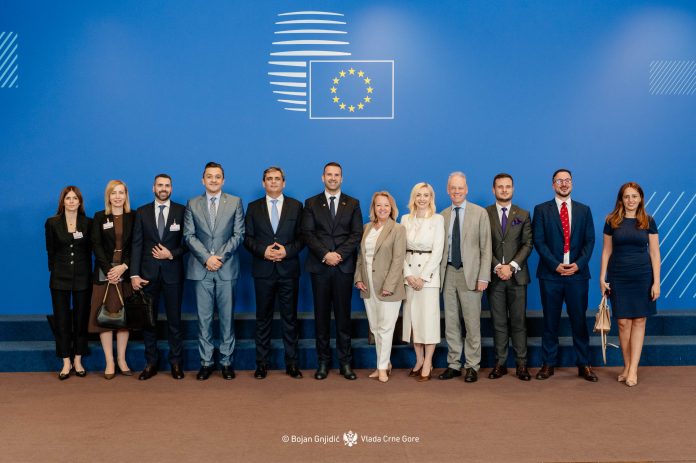Public procurement constitutes one of the key progress indicators in the process of accession to the European Union since it has a direct impact on transparency, responsible management of public funds and fight against corruption.
For us in the Ministry of Finance, this process was not just a negotiation course, but also a way to strengthen our institutions and public procurement system. A voluminous framework of laws and bylaws has been adopted; the first system of Montenegrin electronic public procurement – CEJN has been developed, human resources strengthened, as well as supervision and control mechanisms, while a particular emphasis has been put on training, professionalization and monitoring of the system.
With a view to achieving full alignment with the European Union acquis, Montenegro has significantly improved its legislative framework in the field of public procurement, adopting the Public Procurement Law in 2019. This law is fully aligned with the key EU Directives: 2/14/24/EU, 2014/25/EU, 2017/2364, 2017/2365 and the Directive 2009/81/EZ for the field of defence and security. A large number of bylaws has also been prepared to regulate in details certain aspects of the public procurement system. The Law stipulates the principle of non-discrimination, which means that foreign bidders have an equal treatment as the domestic ones. Principles of environment protection, social and labour law and gender equality are now included in the process of evaluation of bids.
In the field of public-private partnerships and concessions, a new legislative framework has been adopted. It is aligned with the relevant European Union acquis and ensures more efficient implementation of infrastructure and development projects, with the involvement of private sector through clear and transparent procedures.
The reforms implemented in this field include also one of the most important breakthroughs – introduction of the electronic public procurement system, releasing the public procurement procedure of unnecessary paperwork, and increasing transparency and efficiency. Electronic public procurement has changed the concept of public procurement in Montenegro from the one focused on the form to the one emphasizing the most important segment – economically most favourable bid.
CEJN ensures electronic implementation of all stages of public procurement – from planning to publishing contracts and reports on implementation, including protection of the rights, i.e. complaint mechanisms. The number of CEJN users is about 14,000, out of which there are 4,796 active registered users.
All information about public procurement procedures (public calls, plans, decisions, complaints, implementation of contracts) have to be available through CEJN, which ensures full transparency and equal access to information for all interested parties. CEJN is at the same time a tool for fighting corruption, because it ensures an independent insight into the public spending flows and compliance with lawful procedures.
Upgraded CEJN is one of the pillars of the future Strategy for improvement of public procurement policy and public-private partnerships for the period 2026-2030, in line with the recommendations from the World Bank’s MAPS evaluation, another important process that Montenegro participated in.

Ministry of Finance is also implementing professional training and specialization of public procurement officers/ordering entities, bidders and all other persons involved in the public procurement processes, with a view to developing a sustainable training system so that the employees in public procurement activities can respond to the demands of the system, but also that the effects of training can be monitored by testing the acquired knowledge and skills.
Montenegro has developed an institutional framework that ensures an efficient implementation of the public procurement policy, with the key control mechanisms that make the system reliable and stable. On the other side, the data show that competition has been significantly strengthened, so the competitiveness index is now above 3%.
As for monitoring and control mechanisms, it is important to emphasize that, since January 2024, a new system of simple procurement monitoring has been in use. It ensures that the bidders who participate in simple procurement procedures can file a request for monitoring. This prevents violation of fundamental principles of public procurement and potential irregularities in the implementation of this type of procedures. When filed, a request for simple procurement monitoring stops all actions of the ordering entity in that procedure.
During 2024, the total number of the submitted requests for simple procurement monitoring was 161. The Ministry of Finance issued 76 recommendations to remedy irregularities, to analyse the bids again and to assess the bids again, while 12 times they recommended to annul the procedure. The total of 17 requests were forwarded to the Public Procurement Inspectorate for further procedure. In 12 cases the Ministry of Finance confirmed the decision of the ordering entity, while 2 requests for monitoring were not considered because the same entity had already decided about the same issues earlier.
Negotiation chapter 5 is a part of Cluster 1 – Fundamental Rights, and therefore it is even more complex.
One of particularly important reforms for us, with an emphasis on fiscal stability but also on the economic significance for small and medium-size enterprises, comprises measures for limiting direct procurement, introduced on the basis of an annual plan of the ordering entity to reduce their total share and increase transparency. In this respect, monitoring is also very important as a control mechanism for simple procurement and protection of bidders. It is therefore worth mentioning that, in 2025, the Ministry of Finance solved the total of 114 requests for monitoring.
In the period ahead, the focus will remain on development and implementation of the new Strategy for the period 2026-2030 prepared by the Ministry of Finance, strengthening digitalization, professionalization and continuous improvement of the public procurement system in line with the best practices of the European Union Member States.
A particular emphasis in the period to come will be on the strengthening of Montenegro’s anti-corruption framework in public procurement. Montenegro committed to it and defined steps and deadlines for their implementation.
The Code of Ethics in Public Procurement was adopted in early 2025 and published on the website of the Ministry of Finance, and on the e-procurement platform. The Code regulates principles and rules of behaviour of the representatives of ordering entities and economic entities, as well as of other persons who are directly or indirectly involved in the public procurement process. The electronic system has already been upgraded with the function of reporting contracts and conflicts of interest, while the overall process of reporting irregularities will be completed in September this year.
Electronic public procurement system will be upgraded in the period to come, with a view to strengthening anti-corruption mechanisms, introducing „red flags“ (automatic detection of irregularities in the public procurement procedures).
In order to strengthen the fight against corruption, Montenegro is to amend Public Procurement Law and Law on Prevention of Corruption to clearly define corruptive activities in the context of public procurement, as well as actions of authorities in case there is a suspicion or it is established that there are corruptive activities in public procurement procedures. Strengthening anti-corruption activities will be our priority in the months to come.
Our obligation is to ensure that European Union standards are applied in practice, and the Ministry of Finance will be equally determined in that as in the entire negotiation process.
By Jelena Jovetić, MSc, Director General of the Directorate for Managing Public Investment and Public Procurement Policy in the Ministry of Finance
This text was published in the 16th issue of Eurokaz magazine.


